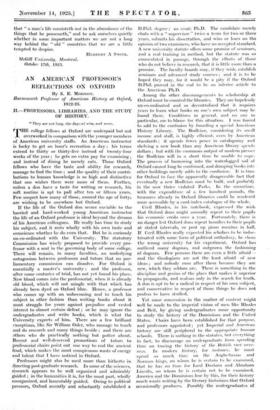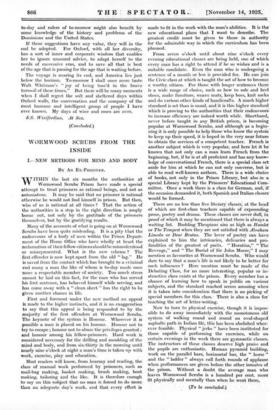AN AMERICAN PROFESSOR'S REFLECTIONS ON OXFORD
By S. E. MORISON.
Harm-worth Professor of American History at Oxford, • 1922-25.
H.—.-PROFESSORS, LIBRARIES, AND THE STUDY OF HISTORY.
"They are not long, the day of wine and roses.
rrHE college fellows at Oxford are underpaid but not overworked in comparison with the younger members of American university staffs. An American instructor is lucky to get an hour's recreation a day ; his terms extend to :thirty or thirty-five instead of twenty-four Weeks of the year ; he gets no extra pay for examining ; and instead of dining he merely cats. Those Oxford fellows who have the taste and ability for research, manage to find the time ; and the quality of their contri- butions to human knowledge is so high and distinctive that one wishes there were more of them. Further, Unless a don have a taste for writing or research, his Soft routine is apt. to pall after ten or fifteen years. Few suspect how many Of those, around the age of forty, are wishing to be anywhere but Oxford.
If the life of the Oxford don seems enviable to the harried and hard-worked young American instructor the life of an Oxford professor is ideal beyond the dreams of his American colleagues. He really has time to study his subject, and it rests wholly with his own taste and Conscience whether he do even that. But he is curiously un- :co-ordinated with the University. The statutory Commission has wisely proposed to provide every pro- fessor with a seat in the governing body of some college. There. will remain, in many faculties, an underlying antagonism between professors and tutors that no par- liamentary commission can dissolve. For Oxford is essentially a master's university; and the professor, after some centuries of trial, has not yet found his place. New blood comes into the professoriat, when it is already old blood, which will . not mingle with that which has already been dyed an Oxford blue. Hence, a professor who comes up with an unbecoming zeal to teach his subject in other fashion than writing books about it must struggle for years against prejudice and vested interest to almost certain defeat ; or he may ignore the Undergraduates and write books, which is what the University expects of him. There are a few brilliant exceptions, like Sir William Osier, who manage to teach and do research and niany'things beside ; and there are 6thers who do practically_ nothing but potter about. Recent and well-deserved -promotions of tutors to professorial chairs point out one Way to end the 'ancient feud, which makes the most conspicuous waste of energy and talent that I have noticed in Oxford.
Professors might also be used more than hitherto in directing post-graduate research. * In some of the sciences, research appeara to be well organized and 'admirably guided ; in the htinianities it is, for the Most part, wholly .unorganized, and lamentablyguided. Owing to political pressure, Oxford reeently and reluctantly' established a D.Phil. degree ; an ersatz Ph.D. The candidate merely chats with a " supervisor" twice a term for two or three years, submits his dissertation, and wins or loses on the opinion of two examiners, who have no accepted standard. A new university statute offers some promise of seminars, and a real training in method, but the statute was so emasculated in passage, through the efforts of those who do not believe in research, that it is little more than a promise. The faculty boards may, if they wish, establish seminars and advanced study courses ;*. and it is to be hoped they .may, for it would be a pity if the Oxford D.Phil. proved in the end to be an inferior article to the American Ph.D.
Among the other discouragements to scholarship at Oxford must be counted the libraries. They are hopelessly un-co-ordinated and so decentralized that. it requires years to learn what books on one's own subject may be found there. Conditions in general, and no one in particular, are to blame for this situation. I was forced to add to the confusion by founding a special American History Library. The Bodleian, considering its small income and staff, is highly efficient, even by American standards ; it spends fewer pence in cataloguing and shelving a new book than any American library sPends dollars ; but with the enormous output of modern presser the Bodleian will in a short time be unable to cope. The process of burrowing into the waterlogged 'soil of Oxford cannot long be continued, and dumping books hitt other buildings merely adds to the confusion. It is time for Oxford to face the apparently disagreeable fact that eventually a new Bodleian nnist be built, and probabcY in the now thrice violated Parks. - In the Meantiine, With the expenditure of a few hundred pounds, the treasures already in Oxford libraries could be rendered More accessible by a card-index catalogue of the whole.
Cecil Rhodes, in his notebook, expressed the Wish that Oxford dons might annually repeat to their pupils his economic credo once a year. Fortunately, there is no danger lest Oxford dons repeat homilies to their pupils at stated intervals, or post up pious maxims in hall If Cecil Rhodes really expected his scholars to be indoc- trinated with some form of political orthodoxy, he chose the Wrong university for his experiment. Oxford has Outlived many dogmas, and outgrown the fashioning Of dogmas. Few persons there arc even a little afraid and the theologians are not the least afraid —of new ideas;, and nobody runs after them because they are new, which they seldom are. There is something in the discipline and genius of the place that makes it superior to propaganda, and zealous only in the search for truth. A don is apt to be a radical in respect of his own subject, and conservative in respect of those things he does not profess to have studied.
Yet some concession in the matter of content might well be made to the imperial vision of men like Rhodes and Belt, by giving undergraduates more opportunity to study the history of the Dominions and the United States. Chairs have been' established for that purpose, and professors appointed ; yet Imperial and American history are still peripheral to the appropriate honour schools. -There is nothing in the statutes, but everything in fact, to discourage an undergraduate from spending time on tracing the history of the British race. over- seas. In modern history, for instance, he must spend so much tithe on the Anglo-Saxon and Norman kings, on whom he is certain to be examined, that he has . no time for Lord Durham and Abraham Lincoln, on whom he is certain not to be examined. America and the Dominions lose by this, for their history much wants writing by the literary historians that Oxford Occasionally produces : Possibly the *undergraduates Of to-day and rulers of to-morrow might also benefit by some knowledge of the history and problems of the Dominions and the United States.
If these suggestions have any value, they will in the end be adopted. For Oxford, with all her diversity, has a sort of inner and corporate wisdom that enables her to ignore unsound advice, to adapt herself to the needs of successive eras, and to save all that is best of the age that is passing for the age that is waiting before.
The voyage is nearing its end, and America lies just below the horizon. To-morrow I shall once more taste Walt Whitman's "joy of being toss'd in the brave turmoil of these times." But there will be many moments when I shall regret the soft and sheltered days within Oxford walls, the conversation and the company of the most humane and intelligent group of people I have ever known. My days of wine and roses are over.
S.S. Winifredian. At Sea.
(Concluded.)



























































 Previous page
Previous page